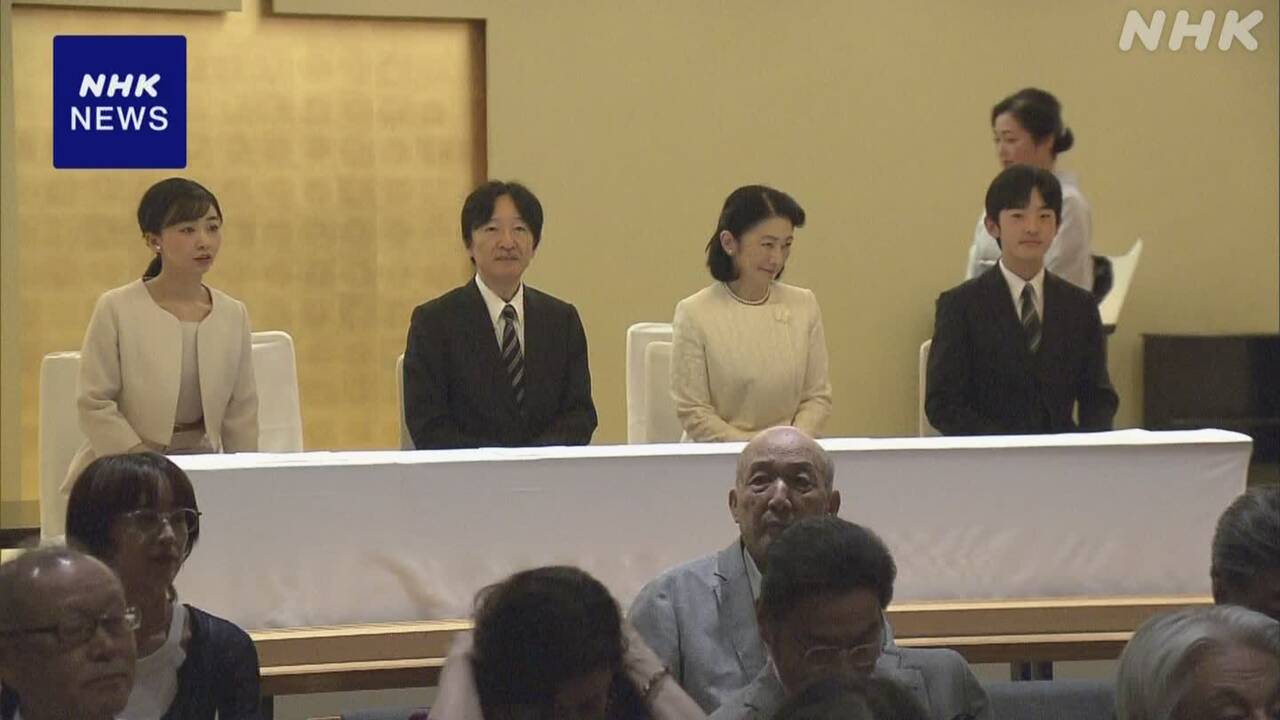Published: 2025-09-13 00:26
秋篠宮ご一家 琉球舞踊を鑑賞 東京 渋谷

秋篠宮ご一家は、東京で開かれた、伝統芸能の琉球舞踊を鑑賞されました。
公演は、戦後80年にあたって東京 渋谷区の能楽堂で開かれ、秋篠宮ご夫妻と次女の佳子さま、それに長男の悠仁さまが入場すると、観客の拍手に会釈をして応えられていました。
出演した人間国宝の志田房子さんは、秋篠宮さまと長年親交があり、紀子さまが大学生だったころ、琉球舞踊を習われていたことがあります。
公演では、志田さんや娘の真木さんが歌や三線(さんしん)の演奏などに合わせて情感豊かに踊りを披露し、ご一家が観客とともに手拍子をされる場面もありました。
公演後にご一家と懇談した真木さんによりますと、衣装に使われている、沖縄の伝統的な織物を紹介したところ、悠仁さまは「気候風土に適した織物ですね」などと話されていたということです。
| # | 言葉 | 意味 |
|---|---|---|
| 5 | さま | さま (様) : 1. Mr.; Mrs.; Miss; Ms. 2. makes a word more polite (usu. in fixed expressions) |
| 3 | 秋篠宮 | あきしののみや (秋篠宮) : Akishinonomiya (surname) |
| 3 | 一家 | いっか (一家) : 1. a family; a household; a home; one's family; whole family 2. (one's own) style; school |
| 3 | 公演 | こうえん (公演) : 1. public performance 2. exhibition in a foreign country |
| 2 | 東京 | とうきょう (東京) : Tokyo |
| 2 | 開く | ひらく (開く) : 1. to open; to undo; to unseal; to unpack 2. to bloom; to unfold; to spread out |
| 2 | 琉球 | りゅうきゅう (琉球) : Ryukyu; chain of southwestern Japanese islands comprising Okinawa Prefecture |
| 2 | 舞踊 | ぶよう (舞踊) : dancing; dance |
| 2 | 悠仁 | ひさひと (悠仁) : Hisahito (masc) |
| 2 | 観客 | かんきゃく (観客) : audience; spectator; spectators |
| 2 | 志田 | した (志田) : Shita (surname) |
| 2 | 真木 | まき (槙) : yew plum pine (Podocarpus macrophyllus) |
| 2 | 織物 | おりもの (織物) : textile; fabric |
| 1 | 伝統芸能 | でんとうげいのう (伝統芸能) : traditional art; traditional performance art |
| 1 | 鑑賞 | かんしょう (鑑賞) : appreciation (of art, music, poetry, etc.) |
| 1 | 戦後 | せんご (戦後) : postwar period; period after Second World War |
| 1 | あたる | あたる (当たる) : 1. to be hit; to strike 2. to touch; to be in contact; to be affixed |
| 1 | 渋谷区 | しぶやく (渋谷区) : Shibuya Ward (place) |
| 1 | 能楽堂 | のうがくどう (能楽堂) : noh theatre; noh theater |
| 1 | 夫妻 | ふさい (夫妻) : husband and wife; married couple |
| 1 | 次女 | じじょ (次女) : second daughter |
| 1 | 佳子 | かいこ (佳子) : Kaiko (fem) |
| 1 | 長男 | ちょうなん (長男) : eldest son (may be the only son); first-born son |
| 1 | 入場 | にゅうじょう (入場) : entrance; admission; entering |
| 1 | 拍手 | はくしゅ (拍手) : clapping hands; applause |
| 1 | 会釈 | えしゃく (会釈) : 1. slight bow (as a greeting or sign of gratitude); nod; salutation 2. consideration; thoughtfulness |
| 1 | 応える | こたえる (応える) : 1. to respond; to answer; to meet (e.g. demands, expectations) 2. to affect; to take a toll; to strike home; to have an effect on; to be hard on someone (e.g. heat, cold, work, illness, etc.); to be a strain |
| 1 | 出演 | しゅつえん (出演) : performance; appearance (in a stage, film, TV show, etc.) |
| 1 | 人間国宝 | にんげんこくほう (人間国宝) : living national treasure |
| 1 | 房子 | のぶこ (房子) : Nobuko (fem) |
| 1 | 長年 | ながねん (長年) : long time; many years |
| 1 | 親交 | しんこう (親交) : intimacy; friendship; friendly relations |
| 1 | 紀子 | いとこ (紀子) : Itoko (fem) |
| 1 | 習う | ならう (習う) : to take lessons in; to be taught; to learn (from a teacher); to study (under a teacher); to get training in |
| 1 | しん | しん (新) : 1. new; neo- 2. newness; novelty |
| 1 | 演奏 | えんそう (演奏) : musical performance |
| 1 | 合わせる | あわせる (合わせる) : 1. to match (rhythm, speed, etc.) 2. to join together; to unite; to combine; to add up |
| 1 | 情感 | じょうかん (情感) : feeling; sensitivity; emotion |
| 1 | 豊か | ゆたか (豊か) : 1. abundant; wealthy; plentiful; rich; affluent 2. very; extremely; full of; great |
| 1 | 披露 | ひろう (披露) : announcement; presentation; demonstration; displaying; showing; introducing; exhibiting; unveiling; revealing; showcasing; performing; giving a rendition |
| 1 | とも | とも (供) : companion; follower; attendant; retinue |
| 1 | 手拍子 | てびょうし (手拍子) : 1. beating time with one's hands; clapping to the beat 2. making a careless move (in go, shogi, etc.); responding to an opponent's move without proper thought |
| 1 | 場面 | ばめん (場面) : 1. scene; setting; place (where something happens); scenario; case 2. scene (in a movie, play); shot |
| 1 | 懇談 | こんだん (懇談) : informal talk |
| 1 | 衣装 | いしょう (衣装) : clothing; costume; outfit; garment; dress |
| 1 | 使う | つかう (使う) : 1. to use (a thing, method, etc.); to make use of; to put to use 2. to use (a person, animal, puppet, etc.); to employ; to handle; to manage; to manipulate |
| 1 | 沖縄 | おきなわ (沖縄) : Okinawa (city, prefecture) |
| 1 | 伝統的 | でんとうてき (伝統的) : traditional; conventional |
| 1 | 気候 | きこう (気候) : climate |
| 1 | 風土 | ふうど (風土) : natural features; topography; climate; spiritual features |
| 1 | 適する | てきする (適する) : to fit; to suit |
| 1 | 話す | はなす (話す) : 1. to talk; to speak; to converse; to chat 2. to tell; to explain; to narrate; to mention; to describe; to discuss |